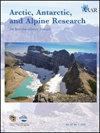Abrupt permafrost thaw accelerates carbon dioxide and methane release at a tussock tundra site
IF 2
4区 地球科学
Q4 ENVIRONMENTAL SCIENCES
引用次数: 4
Abstract
ABSTRACT Abrupt thaw could cause permafrost ecosystems to release more carbon than is predicted from gradual thaw alone. However, thermokarst feature mapping is limited in scope, and observed responses of carbon fluxes to abrupt thaw are variable. We developed a thermokarst detection algorithm that identifies thermokarst features from a single elevation dataset with 71.5 percent accuracy and applied it in Healy, Alaska. Additionally, we investigated the landscape-level variation in carbon dioxide and methane fluxes by extent of abrupt thaw using eddy covariance. Seven percent of the site was classified as thermokarst. Water tracks were the most extensive form of thermokarst, although small pits were much more numerous. Abrupt thaw was positively correlated with carbon uptake during the growing season, when increases in gross primary productivity outpaced increases in ecosystem respiration in vegetation-dense water tracks. However, this was outweighed by higher carbon release in thermokarst features during the nongrowing season. Additionally, abrupt thaw was positively correlated with methane production nearly year-round. Our findings support the hypothesis that abrupt thaw of permafrost carbon will contribute to the permafrost climate feedback above and beyond that associated with gradual thaw and highlights the need to map thermokarst and incorporate abrupt thaw into Earth System Models.柞蚕冻土带永久冻土的突然融化加速了二氧化碳和甲烷的释放
突然解冻可能导致永久冻土生态系统释放的碳比仅通过逐渐融化所预测的要多。然而,热岩溶特征映射的范围有限,观测到的碳通量对突然融化的响应是可变的。我们开发了一种热岩溶检测算法,可以从单个高程数据集中识别热岩溶特征,准确率为71.5%,并将其应用于阿拉斯加州希利。此外,利用涡旋相关方差分析了景观水平上二氧化碳和甲烷通量随突然融化程度的变化。该遗址的7%被归类为热岩溶。水迹是最广泛的热岩溶形式,尽管小坑要多得多。在生长季节,总初级生产力的增长速度超过了植被密集水道生态系统呼吸的增长速度,突变融化与碳吸收呈正相关。然而,这被非生长季节热岩溶特征中较高的碳释放所抵消。此外,突变解冻与甲烷产量几乎全年呈正相关。我们的研究结果支持了这样的假设,即永久冻土碳的突然融化将有助于永久冻土气候反馈,而不仅仅是与逐渐融化相关的反馈,并强调了绘制热岩溶图并将突然融化纳入地球系统模型的必要性。
本文章由计算机程序翻译,如有差异,请以英文原文为准。
求助全文
约1分钟内获得全文
求助全文
来源期刊
CiteScore
3.00
自引率
5.00%
发文量
37
审稿时长
7 months
期刊介绍:
The mission of Arctic, Antarctic, and Alpine Research (AAAR) is to advance understanding of cold region environments by publishing original scientific research from past, present and future high-latitude and mountain regions. Rapid environmental change occurring in cold regions today highlights the global importance of this research. AAAR publishes peer-reviewed interdisciplinary papers including original research papers, short communications and review articles. Many of these papers synthesize a variety of disciplines including ecology, climatology, geomorphology, glaciology, hydrology, paleoceanography, biogeochemistry, and social science. Papers may be uni- or multidisciplinary but should have interdisciplinary appeal. Special thematic issues and proceedings are encouraged. The journal receives contributions from a diverse group of international authors from academia, government agencies, and land managers. In addition the journal publishes opinion pieces, book reviews and in memoria. AAAR is associated with the Institute of Arctic and Alpine Research (INSTAAR) the oldest active research institute at the University of Colorado Boulder.

 求助内容:
求助内容: 应助结果提醒方式:
应助结果提醒方式:


